This year will be the first time in its long history that the e-commerce market will see negative revenue growth — a 2.5% drop versus the 10% growth predicted for 2022 a year ago.
Many e-commerce players experienced a degradation in performance due to the global recession. As a result, they had to deal with downsizing human resources, redirecting advertising budgets, and optimizing processes.
Are figures below expectations “normal” and is there something to be done about this? Let's try to get this straight.
Current situation in figures
Despite the fact that in terms of revenue e-commerce won’t break the previous record this year, the share of e-commerce in the digital economy is still the largest and makes 68%.
 Many major players in the market this year were forced to take measures to prevent businesses from “eating themselves” through optimizing processes. Some of the ways were not the most pleasant for employees, but that’s the price of getting a business out of a loss-making state. The average change in stock prices of key players like Amazon and Etsy made up -55.2%. The situation with the stock prices of Shopify is even worse.
Many major players in the market this year were forced to take measures to prevent businesses from “eating themselves” through optimizing processes. Some of the ways were not the most pleasant for employees, but that’s the price of getting a business out of a loss-making state. The average change in stock prices of key players like Amazon and Etsy made up -55.2%. The situation with the stock prices of Shopify is even worse.
 One thing is for sure, e-commerce will see negative growth in 2022.
One thing is for sure, e-commerce will see negative growth in 2022.
 If we talk in categories, the most breakeven of them turned out to be the food and beverages, which is natural. Yet, the showings are still worse than they used to be in 2021.
If we talk in categories, the most breakeven of them turned out to be the food and beverages, which is natural. Yet, the showings are still worse than they used to be in 2021.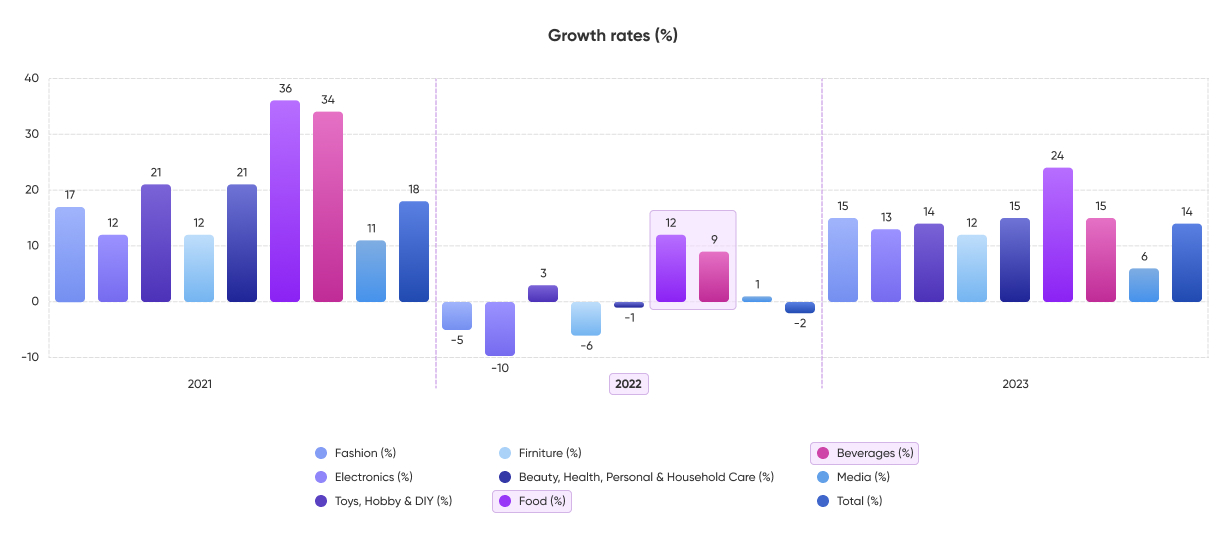 With the easing of anti-epidemic measures, people began to pump money into traveling and tourism. So these e-commerce domains felt much better than, say, streaming platforms.
With the easing of anti-epidemic measures, people began to pump money into traveling and tourism. So these e-commerce domains felt much better than, say, streaming platforms.

Challenges for e-commerce
Pressure on supply chains is back again at its highest peaks.
 Inflation consequences are predicted to be substantial, which is already confirmed by the statistics.
Inflation consequences are predicted to be substantial, which is already confirmed by the statistics.
 The rise in prices and declining purchasing power have had a bad effect on many industries, including e-commerce.
The rise in prices and declining purchasing power have had a bad effect on many industries, including e-commerce.
 Pressure on supply chains, inflation consequences, and decline in purchasing power — are the products of the global situation and the impacts on the negative revenue growth for e-commerce in 2022.
Pressure on supply chains, inflation consequences, and decline in purchasing power — are the products of the global situation and the impacts on the negative revenue growth for e-commerce in 2022.
Trends in B2C and B2B
Blockchain, artificial intelligence, augmented and virtual reality, together with cryptocurrency payment platforms continue forming seamless shopping for both B2B and B2C. The metaverse furthermore blurs the lines between the physical and digital worlds immersing shoppers in an omnichannel experience. Deeper integration of new technologies in online commerce creates new opportunities for both businesses and end users.

In B2C, experts report a smooth transition from a marketing-first to a direct-to-customers (D2C) approach. Direct appeal to the customer and rejection of traditional advertising methods are already giving greater profit margins to companies that have opted for the D2C approach.

Yet, this is definitely not the one-size-fits-all approach. Many companies preferred increasing their costs on advertising instead.
 If we talk about B2B in terms of geo, we’ll see that dramatic growth is predicted for China and India, where all other countries also go into the positive rise, but with less sharp amplitudes.
If we talk about B2B in terms of geo, we’ll see that dramatic growth is predicted for China and India, where all other countries also go into the positive rise, but with less sharp amplitudes.
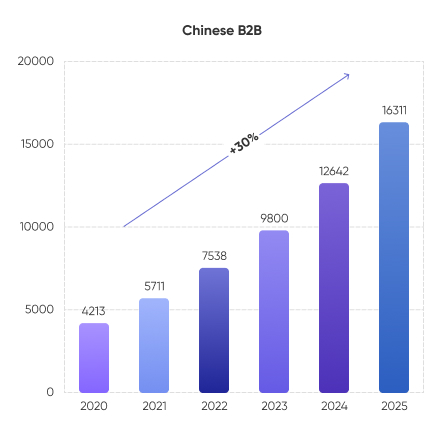 | 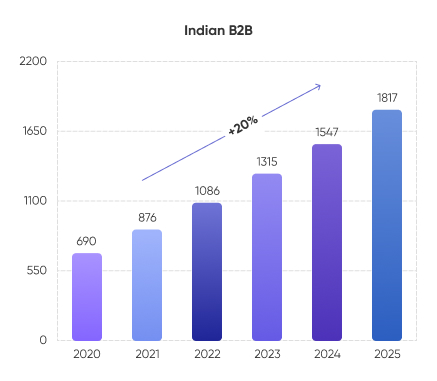 |
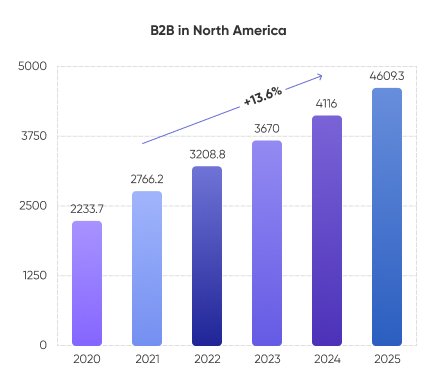 | 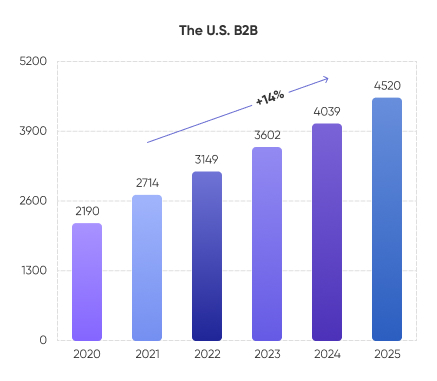 |
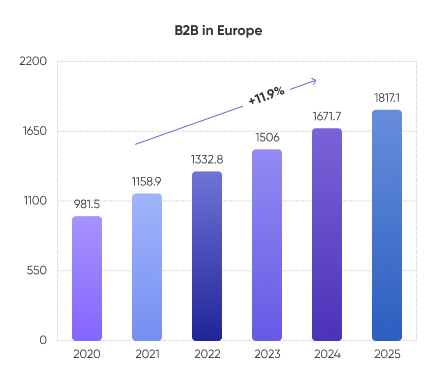 | 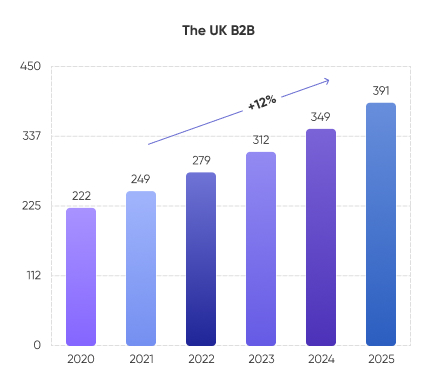 |
Another trend in the B2B market is that the horizontal marketplace model gives way to the vertical.
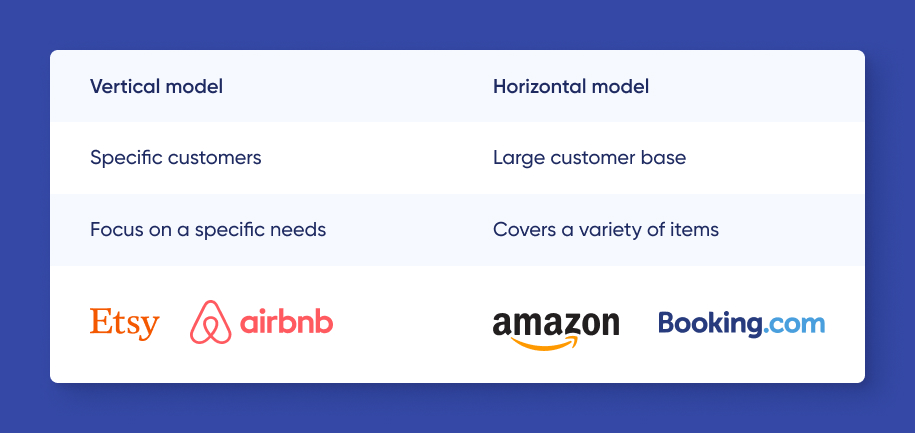
Personalization is a timeless trend that is always with us. Now businesses are maximizing their personalization through leveraging big data, AI, ML, flexible quoting, account-specific buying agreements, and more.

B2B is shifting to mobile e-commerce. As for today, mobile influences over 40% of revenue in leading B2B organizations, and the trend doesn’t seem to be decreasing.
 Businesses give preference to cloud platforms, as they overcome homegrown systems in many ways, which is why they are growing in popularity.
Businesses give preference to cloud platforms, as they overcome homegrown systems in many ways, which is why they are growing in popularity.

Far from being a new trend, omnichannel is still growing in popularity, and more and more businesses are abandoning multichannel strategies and switching to omnichannel.

Business to everyone (B2E) is becoming a new approach, both for B2C and B2B. It mainly results in the fact that certain characteristics of B2C are adopted by B2B and vice versa. Mobile commerce, which is now catching on in B2B, is a feature that used to be more inherent in the B2C market.

What the future holds for e-commerce
While the situation for e-commerce is not ideal right now, experts are predicting growth for online commerce by 2025.
 Revenue growth is expected to recover next year and increase by 14% by 2023.
Revenue growth is expected to recover next year and increase by 14% by 2023.
 Even if there are a certain number of problems that we all have to work with at the moment, experts are confident that online stocks will eventually grow and revenue growth will return to its previous level.
Even if there are a certain number of problems that we all have to work with at the moment, experts are confident that online stocks will eventually grow and revenue growth will return to its previous level.
List of sources
- Digital Economy Compass 2022 Chapter 2 – From frenzy to fall: is Commerce back to normal? by Statista
- eCommerce Whitepaper B2B Q3 by Statista
- Report by Google and the Boston Consulting Group
- Marketing First by Entrepreneur
- and others











